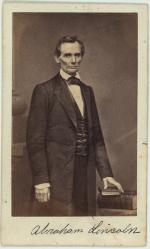![header=[Marker Text] body=[In May, 1859, Horace Greeley met with notable political leaders to create a boom to nominate Abraham Lincoln for President. The events that ensued at the Republican National Convention in Chicago paralleled the strategy planned at the parley held in this building. ] sign](kora/files/1/10/1-A-119-139-ExplorePAHistory-a0a4p7-a_450.gif)
Mouse over for marker text
Name:
Lincoln Nomination
Region:
Poconos / Endless Mountains
County:
Wayne
Marker Location:
115 9th St., Honesdale
Dedication Date:
August 26, 1968
Behind the Marker
Horace Greeley, a prominent newspaper editor from New York, came frequently to the northeast corner of Pennsylvania, visiting both Pike and Wayne counties. There, in the early 1840s, he had helped sponsor an experimental socialst community called  Sylvania. The area was a familiar vacation spot for middle class families from New York or New Jersey. According to local tradition, the meeting to plan Lincoln's future took place in Honesdale in 1859 at the law office of Samual Dimmick, a local political figure and popular tavern owner.
Sylvania. The area was a familiar vacation spot for middle class families from New York or New Jersey. According to local tradition, the meeting to plan Lincoln's future took place in Honesdale in 1859 at the law office of Samual Dimmick, a local political figure and popular tavern owner.
But local tradition and historical reality are at odds in the case of this marker. There may have been a political meeting in northeastern Pennsylvania to plot strategy for the 1860 Republican convention, and Horace Greeley may have attended it, but it was definitely not his intention to "boom" Lincoln for president. The editor recalled that he had "endeavored to fix on the proper candidate for President," for months before the convention, but remembered clearly that Lincoln was not his preference. "My choice was Edward Bates, of St. Louis," he noted in his memoir.
1860 Republican convention, and Horace Greeley may have attended it, but it was definitely not his intention to "boom" Lincoln for president. The editor recalled that he had "endeavored to fix on the proper candidate for President," for months before the convention, but remembered clearly that Lincoln was not his preference. "My choice was Edward Bates, of St. Louis," he noted in his memoir.
Bates was a well-known lawyer, a former congressman, and someone who was considered acceptable to the "Know Nothing" movement, which was an anti-immigrant faction popular in the North. But he was too old – nearly seventy – and had spent most of his career behind the judge's bench, not on the political stump.
The Republicans had a new party and wanted a fresh face. The frontrunner for their nomination was Senator William Seward, a Republican from New York. He and Greeley had once been close allies, but the eccentric editor had fallen out with him and by 1859 was trying desperately to make sure that his former friend got defeated. He was pleased with Abraham Lincoln's selection, but was not a prime mover behind the decision.
But local tradition and historical reality are at odds in the case of this marker. There may have been a political meeting in northeastern Pennsylvania to plot strategy for the
Bates was a well-known lawyer, a former congressman, and someone who was considered acceptable to the "Know Nothing" movement, which was an anti-immigrant faction popular in the North. But he was too old – nearly seventy – and had spent most of his career behind the judge's bench, not on the political stump.
The Republicans had a new party and wanted a fresh face. The frontrunner for their nomination was Senator William Seward, a Republican from New York. He and Greeley had once been close allies, but the eccentric editor had fallen out with him and by 1859 was trying desperately to make sure that his former friend got defeated. He was pleased with Abraham Lincoln's selection, but was not a prime mover behind the decision.






